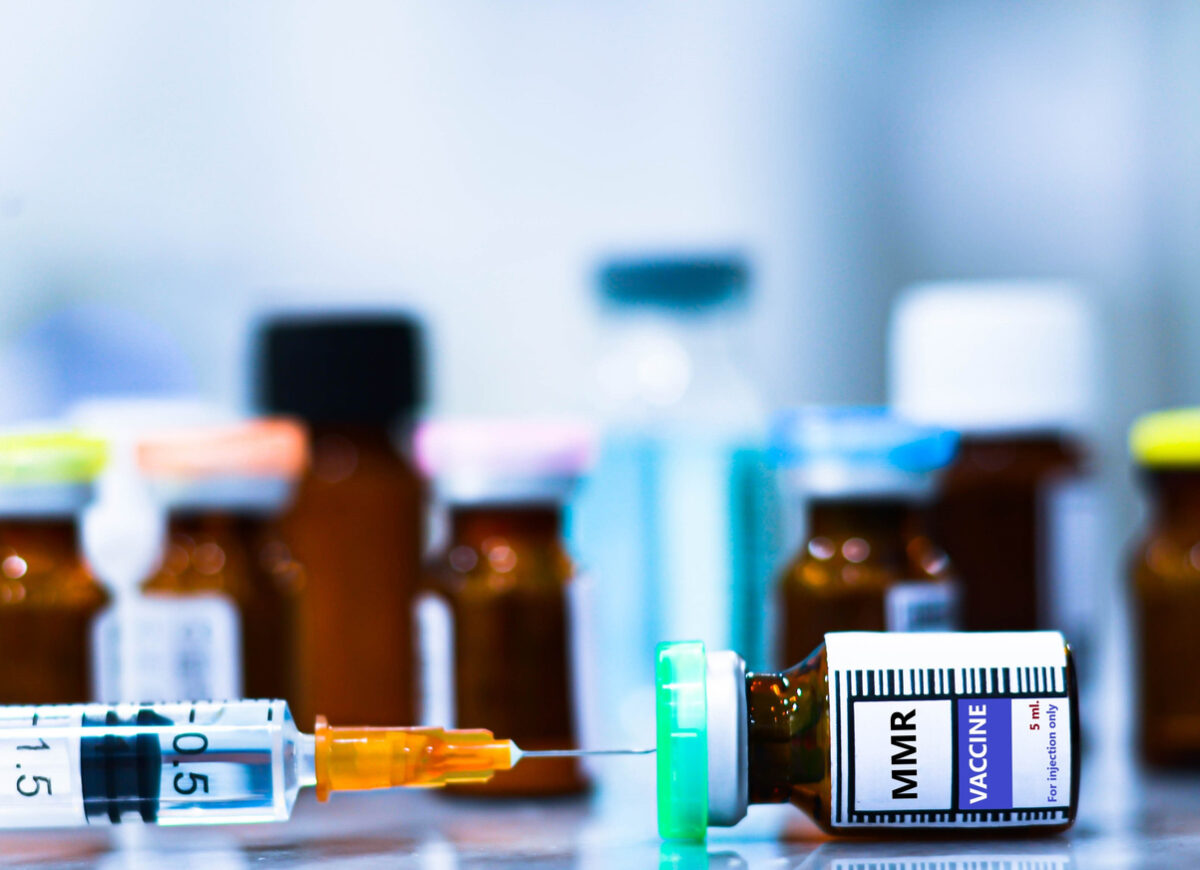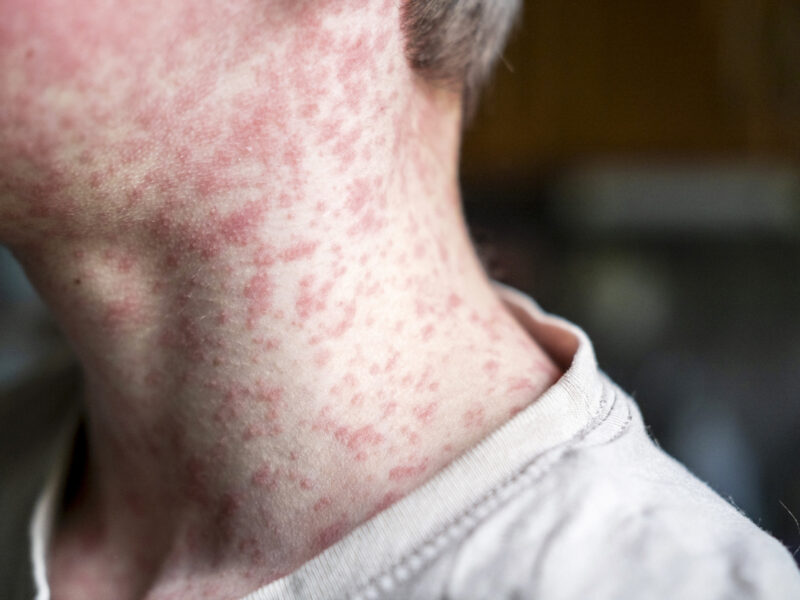Table of contents
On Friday, March 14, Oakland County confirmed Michigan’s first measles case of 2025, following outbreaks in Texas, New Mexico, and over a dozen other states. The Michigan case is connected with international travel, and others may have been exposed between March 3 and March 10.
Measles is a highly contagious disease that can lead to pneumonia, hearing loss, encephalitis, hospitalization, and death, with children being especially vulnerable. Two have already died in this year’s U.S. outbreaks.
Symptoms generally start seven to 14 days after exposure, although it can take up to 21 days for these to appear. Early symptoms include fever, runny nose, cough, and red, watery eyes. These may be followed by white spots on the inside of the mouth and a rash that begins on the face that spreads down to the trunk, arms, and legs.
Although most U.S. residents are vaccinated for measles, the lack of other exposure to the disease means unvaccinated individuals generally have no immunity, according to Dr. Natasha Bagdasarian, chief medical executive for the Michigan Department of Health and Human Services. The contagiousness of the disease adds to the risk for unvaccinated individuals, making them extremely vulnerable.
“Measles is one of the most transmissible diseases that we see in the infectious disease world,” Bagdasarian told Planet Detroit, noting the disease can linger in airborne particles for up to 2 hours. This translates into a 90% infection rate. In other words, if a group of 10 unvaccinated people are exposed to the disease, nine will generally be infected.
Falling vaccination rates, both in the U.S. and abroad, and travel are driving the measles outbreak, health officials say. They warn that measles outbreaks can be highly localized, affecting non-vaccinated populations, even in areas that have a high vaccination rate.
In Michigan, the number of 19-35-month-olds who had received at least their first dose of the measles-mumps-rubella vaccine fell from about 76% before the Covid pandemic to 70% after, with some areas seeing steeper declines than others, Bagdasarian said.
She noted that vaccination rates increase among children as they enter kindergarten, and the overall vaccination rate is near 90% statewide.
Outbreaks are more likely to occur when community vaccination rates fall below 95%, according to the Centers for Disease Control and Prevention.
The good news is that the MMR vaccine can prevent 97% of measles infections and generally provides lifetime protection. Here is the latest on who needs to receive a measles vaccine and where to get one.
What are the guidelines for measles vaccinations?
The U.S. Centers for Disease Control offers the following guidelines for vaccinations:
- A first dose of the measles-mumps-rubella vaccine for children at 12-15 months old, with a second dose administered between ages 4 and 6.
- Two doses of the MMR vaccine for anyone born during or after 1957 who lacks evidence of immunity to measles or vaccination. The second dose should be given 28 days after the first dose or later.
- Those exposed to measles who cannot demonstrate immunity should receive a dose of the vaccine. If done within 72 hours of exposure, this can provide some protection or lead to a milder disease. Within six days of exposure, some people may be given a medicine called immunoglobulin (IG), which provides some protection against the disease or can lead to milder illness.
Bagdasarian said the measles vaccine offers strong lifetime protection for 97% of those who receive it, with the remaining 3% likely to experience only a mild illness and unlikely to pass the disease on to others.
Those vaccinated between 1968 and 1989 likely only received one shot and those vaccinated before 1968 were given a less effective vaccine, The New York Times reports. A single dose offers 93% protection. Some people vaccinated before 1989 may want to speak with their doctor about receiving a booster, especially if they are traveling internationally.
Those born before 1957 are presumed to have been exposed to measles and have some protection. The CDC offers special vaccination guidelines for health care workers born before 1957 and members of other sensitive populations.
Masking may also be helpful for preventing exposure, but a tight fitting mask like a N95 and eye protection is required, Bagdasarian said.
Although shortages of the MMR vaccine have been reported in Texas, none of the local health officials Planet Detroit spoke with reported local issues with vaccine availability.
Where can metro Detroiters go to get vaccinated?
In addition to pediatricians’ offices, pharmacies, and other facilities that administer vaccines, metro Detroit cities and counties offer measles immunizations at the following locations:
City of Detroit
The Detroit Health Department Immunizations Clinic, 100 Mack Ave., Detroit, MI 48201, 313-876-IMMS (4667).
Monday-Friday: 8:30 a.m.-4 p.m.
Every first and third Thursday: 10 a.m.-6 p.m.
Detroit Health Department-Satellite Immunizations Clinic, 5555 Conner Ave., Suite 2224, Detroit 48213, 313-876-IMMS (4667).
Wednesdays: 9 a.m.-3:30 p.m.
Wayne County
Wayne County Public Health: 33030 Van Born Road, Wayne, MI 48184. 734-727-7101.
Monday-Friday: 8 a.m.-4:30 p.m.
MMR vaccines are available to children with Medicaid, and children or adults who are under/uninsured. Walk-ins and appointments are available.
Macomb County
The VerKuilen Building in Clinton Township
Entrance G, 21885 Dunham Road, Clinton Township, MI 48036, 586-469-5372.
Monday, Tuesday, Thursday, and Friday: 8:30 a.m.-4:30 p.m.
Wednesday: 8:30 a.m.-6 p.m.
Closed daily from 12-1 p.m.
Southwest Health Center in Warren/Majestic Plaza
27690 Van Dyke Ave., Suite B, Warren, MI 48093, 586-465-8537.
Monday, Tuesday, Wednesday, and Friday: 8:30 a.m.-4:30 p.m.
Thursday: 8:30 a.m.-6 p.m.
Closed daily from 12-1 p.m.
Southeast Family Resource Center/St. Clair Shores,25401 Harper Ave., Saint Clair Shores, MI 48081, 586-466-6800.
Tuesday and Thursday: 8:30 a.m.-4:30 p.m.
Closed daily from 12-1 p.m.
Oakland County
Oakland County Health Division clinics at 27725 Greenfield Road in Southfield and 1200 North Telegraph Road, Building 34 East in Pontiac. More information about measles and getting vaccinated can be found on the Health Division’s website at oakgov.com/health or by contacting Nurse on Call at 800-848-5533 or noc@oakgov.com.
Monday, Wednesday, and Friday 8:30 a.m.-5 p.m.
Tuesday 9:30 a.m.-6 p.m. and Thursday 7:30 a.m.-5 p.m.
Oakland County offers discounted/sliding fees for those who are underinsured and uninsured. The MMR vaccine costs $76 per dose for the two-dose series. There is a $7 fee per vaccination, per client, with additional fees for credit card payments. No one will be denied access for inability to pay.
Where parents can find school vaccination information
Parents can find information about vaccination levels at childcare centers, kindergartens, middle schools, and high schools at this web address:
https://www.michigan.gov/mdhhs/adult-child-serv/childrenfamilies/immunizations/data-statistics/school-immunization-data
Michigan provides a summary of the immunization data for school children and vaccination requirements at this link.
MORE FROM PLANET DETROIT
Why Michigan is vulnerable to measles outbreaks: ‘Public health has been a victim of our own success’
A surge in measles cases in Texas and other states is raising concerns in Michigan where declining vaccination rates could lead to local outbreaks.
What climate change means for bird flu — and the soaring price of eggs
This story was originally published by Grist. Sign up for Grist’s weekly newsletter here. By FRIDA GARZA and ZOYA TEIRSTEINGrist Buying eggs at the grocery store has become a major headache for U.S. consumers, with the average price of a dozen large eggs in a typical American city reaching $4.95 last month. Since the start…
What does AI mean for Michigan’s environment?
Michigan’s tax breaks for data centers may raise energy costs, increase water usage and jeopardize the state’s climate plan as AI technology advances.





